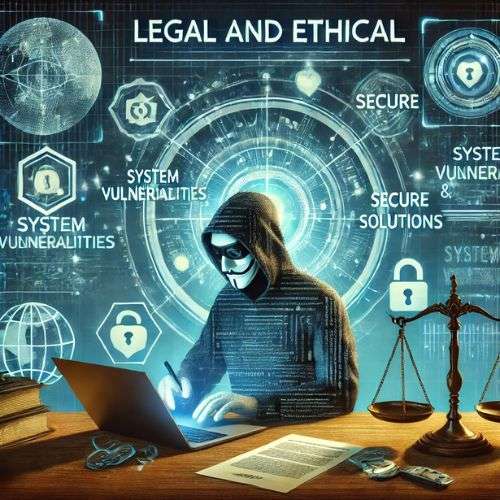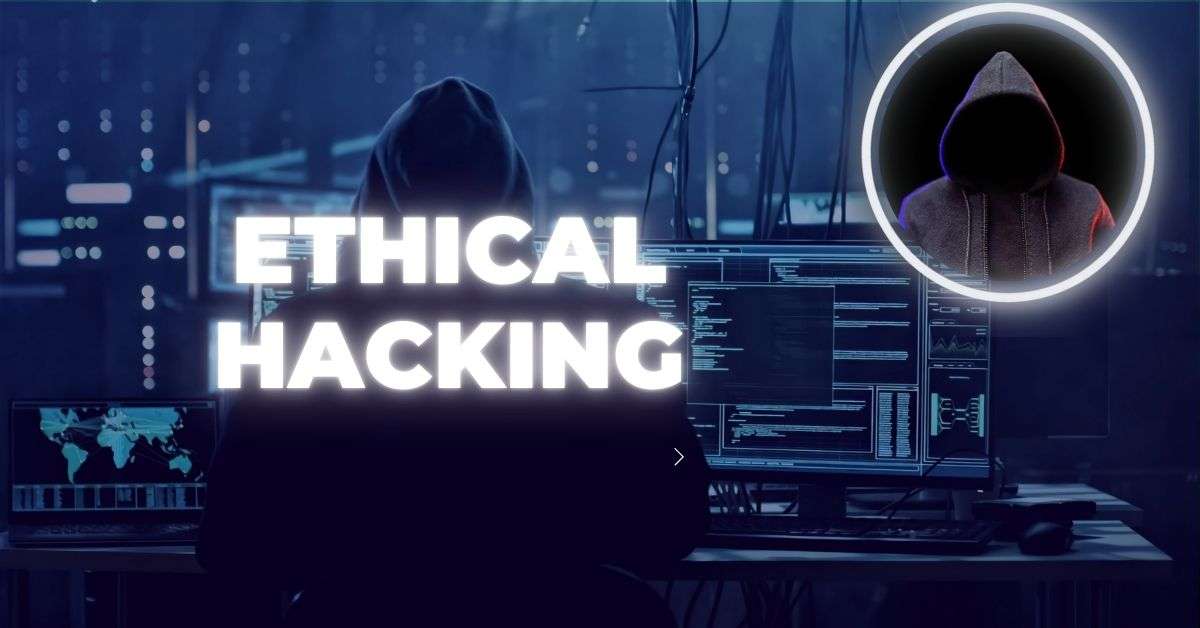In a world where cybercrime costs businesses billions annually, a new breed of digital warriors has emerged: ethical hackers. 🛡️💻 These modern-day heroes use their skills not for malicious purposes, but to protect and defend our digital landscapes. But what exactly is ethical hacking, and why is it so crucial in today’s interconnected world?
Imagine a team of experts, armed with the same tools and techniques as cybercriminals, working tirelessly to fortify your digital defenses. That’s the essence of ethical hacking. From Fortune 500 companies to government agencies, organizations are now embracing these white-hat hackers to stay one step ahead of malicious actors. As we delve into the fascinating world of ethical hacking, we’ll explore the skills, techniques, and real-world applications that make this field both challenging and rewarding.
Join us as we uncover the secrets of ethical hacking, from understanding its core principles to mastering the tools of the trade. We’ll guide you through the essential skills needed, common techniques employed, and the methodologies that shape this dynamic field. Whether you’re a curious tech enthusiast or a seasoned IT professional, this journey into the realm of ethical hacking promises to be both enlightening and thought-provoking. Are you ready to peek behind the digital curtain? Let’s begin!
What is Ethical Hacking?

Ethical hacking is the practice of identifying and addressing vulnerabilities in digital systems, networks, and applications to enhance their security. Unlike malicious hacking, ethical hacking is authorized and conducted within a defined scope, with the goal of protecting sensitive data and preventing cyberattacks. Professionals engaged in ethical hacking are often referred to as “white hat hackers” because they use their skills for constructive purposes.
Key aspects of ethical hacking include:
- Authorization: Ethical hackers work with the permission of system owners to perform security assessments.
- Purpose: Their goal is to identify weaknesses and provide solutions before malicious actors can exploit them.
- Tools and Techniques: Ethical hackers employ the same tools and methods as malicious hackers but use them to safeguard systems.
Ethical hacking is a critical component of cybersecurity, offering organizations insights into potential threats and helping them build stronger defenses.
The Role of Ethical Hacking in Cybersecurity
Ethical hacking is an integral part of modern cybersecurity, bridging the gap between potential threats and robust defenses. By proactively identifying and addressing vulnerabilities, ethical hackers play a crucial role in safeguarding digital assets and ensuring the trustworthiness of systems.
1. Proactive Threat Mitigation
Ethical hackers simulate cyberattacks to identify weaknesses in systems before malicious actors can exploit them. This proactive approach helps organizations stay one step ahead of cybercriminals and minimizes the risk of breaches.
2. Strengthening Security Protocols
By testing firewalls, encryption methods, and other security measures, ethical hackers ensure that systems are fortified against evolving threats. Their work leads to the development of more resilient protocols and technologies.
3. Preventing Financial and Reputational Losses
A cyberattack can cost organizations millions in damages and severely harm their reputation. Ethical hacking helps prevent such incidents, preserving both financial resources and public trust.
4. Compliance with Regulations
Many industries require organizations to meet strict security standards. Ethical hackers assist in ensuring compliance with regulations like GDPR, HIPAA, and PCI DSS by identifying and addressing security gaps.
5. Protecting Sensitive Data
From customer information to proprietary business data, ethical hacking safeguards critical assets from unauthorized access, theft, or misuse. This is especially vital in sectors like finance, healthcare, and government.
6. Enhancing Cybersecurity Awareness
Ethical hackers also play a key role in educating organizations about potential threats, fostering a culture of cybersecurity awareness, and training employees to recognize and respond to risks effectively
How Does Ethical Hacking Work?
The ethical hacking process involves analyzing an organization’s infrastructure to identify and fix vulnerabilities. Ethical hackers apply their knowledge and skills to pinpoint weak spots in IT systems, networks, databases or applications. Techniques include social engineering, web applications and servers, wireless networks, and system hacking.
Ethical hackers use tools and frameworks such as Wireshark, Metasploit Framework, Nmap, and others to execute these techniques effectively. These tools help them simulate potential attacks, analyze systems, and strengthen security measures.
Key Ethical Hacking Techniques

Penetration Testing (Pen Testing)
Penetration testing involves simulating real-world cyberattacks to evaluate the security of a system, network, or application.
- Objective: Identify vulnerabilities and assess the effectiveness of existing security measures.
- Tools Used: Metasploit, Burp Suite, and Nessus.
Social Engineering
Social engineering exploits human behavior to gain unauthorized access to systems or sensitive information.
- Examples: Phishing emails, pretexting, and baiting.
- Purpose: Test the organization’s ability to handle manipulation-based attacks.
Network Scanning
- Techniques:
- Port Scanning: Detects open ports using tools like Nmap.
- Vulnerability Scanning: Identifies weaknesses in network security.
- Outcome: Helps in assessing network exposure to external threats.
Password Cracking
Ethical hackers use password-cracking tools to test the strength of user credentials and encryption.
- Methods: Brute force, dictionary attacks, and rainbow table attacks.
- Tools: John the Ripper, Hashcat.
Web Application Testing
Network scanning identifies active devices, open ports, and potential vulnerabilities within a network.
- Techniques:
- Port Scanning: Detects open ports using tools like Nmap.
- Vulnerability Scanning: Identifies weaknesses in network security.
- Outcome: Helps in assessing network exposure to external threats.
Legal and Ethical Boundaries

A. Understanding the Code of Ethics in Ethical Hacking
Ethical hacking operates within a framework of integrity and professionalism. The code of ethics governs how ethical hackers conduct their work, emphasizing respect for privacy, transparency in operations, and adherence to legal boundaries. Ethical hackers are expected to disclose vulnerabilities responsibly, maintain confidentiality, and avoid actions that could harm an organization or its stakeholders. This ethical foundation is vital for fostering trust between hackers and their clients.
B. Laws Governing Ethical Hacking: A Global Perspective
Ethical hacking’s legality varies across regions, governed by diverse laws and regulations. In the United States, laws like the Computer Fraud and Abuse Act (CFAA) regulate hacking activities, while the General Data Protection Regulation (GDPR) in the European Union ensures data protection and mandates stringent security practices. Some countries have specific certifications or government frameworks for ethical hacking, creating a standardized approach. Staying informed about these regulations is essential for ethical hackers working in international or cross-border contexts.
C. Consequences of Crossing the Line
Operating outside legal or ethical boundaries can lead to severe consequences, even for well-intentioned hackers. Unauthorized testing or failure to obtain proper permissions can result in lawsuits, reputational damage, or even criminal charges. Missteps in handling sensitive data or overstepping the agreed scope of work can erode client trust and harm professional credibility. Ethical hackers must meticulously document their activities, maintain clear communication with clients, and strictly adhere to the agreed scope and regulations to avoid such pitfalls.
Navigating the legal and ethical landscape requires vigilance, clarity, and a commitment to upholding the principles that define ethical hacking. This ensures that the practice contributes positively to cybersecurity without compromising legality or morality.
Future of Ethical Hacking

The Rise of Ethical Hacking as a Service (EHaaS)
As organizations increasingly recognize the importance of proactive security measures, Ethical Hacking as a Service (EHaaS) is gaining momentum. This model allows businesses to outsource ethical hacking to specialized firms, ensuring regular and comprehensive security assessments. EHaaS offers scalability, cost-effectiveness, and access to expert knowledge, making it an attractive option for organizations of all sizes. By adopting EHaaS, companies can stay ahead of evolving threats while focusing on their core operations.
AI-Powered Ethical Hacking: Opportunities and Risks
The integration of artificial intelligence into ethical hacking is revolutionizing the field. AI enhances vulnerability detection, automates repetitive tasks, and enables ethical hackers to analyze vast amounts of data more efficiently. Tools powered by machine learning can identify complex attack patterns and predict potential threats. However, this advancement also brings risks. Malicious actors can exploit AI, creating sophisticated attacks that are harder to detect. Ethical hackers must balance leveraging AI’s capabilities with mitigating the new vulnerabilities it introduces.
Evolving Threats and the Need for Constant Vigilance
Cyber threats are becoming increasingly sophisticated, with attackers employing advanced tactics like polymorphic malware, zero-day exploits, and AI-driven attacks. The future of ethical hacking lies in continuous learning and adaptation. Ethical hackers must stay informed about emerging technologies and attack vectors to remain effective. This requires ongoing training, collaboration with global security communities, and the development of innovative tools and methodologies.
How to Get Started in Ethical Hacking
Breaking into the field of ethical hacking requires a mix of technical skills, certifications, and a proactive approach to learning. If you’re interested in becoming an ethical hacker, here’s a step-by-step guide to help you get started:
1. Understand the Basics of Cybersecurity
Before diving into ethical hacking, build a strong foundation in cybersecurity concepts. Learn how networks, operating systems, and applications work and the common vulnerabilities they face.
- Key Topics to Cover:
- Networking protocols (TCP/IP, DNS, HTTP).
- Basics of firewalls, encryption, and authentication mechanisms.
- Types of cyber threats, such as malware, phishing, and denial-of-service (DoS) attacks.
2. Develop Technical Skills
Ethical hacking requires proficiency in multiple technical domains:
- Programming: Learn languages like Python, C, Java, and scripting with Bash or PowerShell.
- Networking: Gain knowledge of tools like Wireshark for packet analysis and Nmap for network scanning.
- Operating Systems: Familiarize yourself with Linux (especially Kali Linux) and Windows systems.
- Web Development: Understanding web technologies (HTML, CSS, JavaScript) is critical for web application testing.
3. Master Ethical Hacking Tools
Get hands-on experience with tools used for ethical hacking:
- Penetration Testing: Metasploit, Burp Suite.
- Network Scanning: Nmap, Nessus.
- Password Cracking: Hashcat, John the Ripper.
- Wireless Security: Aircrack-ng.
4. Earn Certifications
Certifications validate your skills and open doors to job opportunities. Start with beginner certifications and work your way up:
- Entry-Level: CompTIA Security+, Certified Ethical Hacker (CEH).
- Intermediate: Offensive Security Certified Professional (OSCP).
- Advanced: GIAC Penetration Tester (GPEN), Offensive Security Experienced Penetration Tester (OSEP).
5. Stay Updated on Cybersecurity Trends
Cybersecurity is a constantly evolving field. Stay informed about the latest threats, tools, and techniques:
- Follow blogs like Krebs on Security and Threatpost.
- Engage with the ethical hacking community through forums and social media.
- Attend cybersecurity webinars, conferences, and meetups.
Conclusion
Ethical hacking plays a vital role in strengthening cybersecurity defenses. By identifying vulnerabilities and weaknesses in systems, ethical hackers help organizations proactively address potential threats before malicious actors can exploit them. From penetration testing to vulnerability assessments, ethical hacking encompasses various techniques that contribute to a robust security posture.
As cyber threats continue to evolve, the demand for skilled ethical hackers is on the rise. Aspiring professionals in this field should focus on developing a strong foundation in programming, networking, and security principles. By staying updated with the latest tools and methodologies, ethical hackers can make significant contributions to protecting digital assets and maintaining the integrity of our increasingly connected world.
About Us
NuageNetz IT Services Pvt. Ltd. is a cutting-edge IT company that specializes in Cloud Computing, Web Development, DevOps and Agile Methodologies. Our team of skilled professionals is dedicated to providing exceptional services to our clients using the latest technologies and tools
